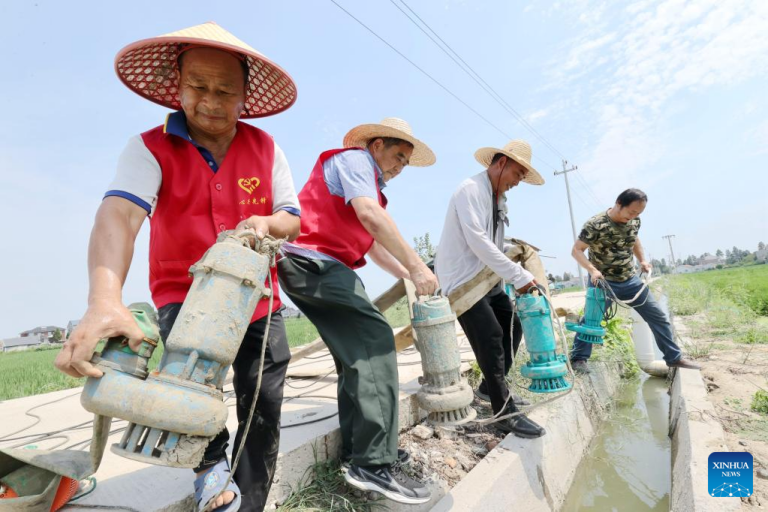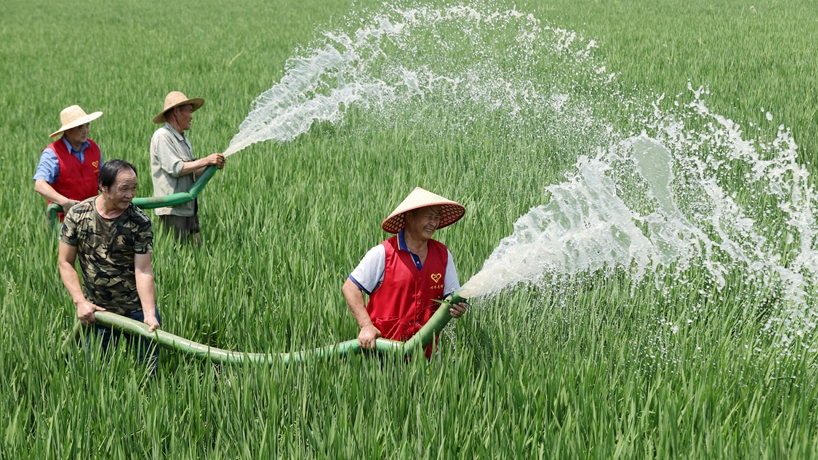
China experiences the most intense heat wave since national weather records began in 1961, which has caused power crunches, forest fires and dried-up rivers.
Over the past 60 days, the power load on the electricity supply was far heavier than normal due to the extreme heat in Sichuan, Jiangsu and Hubei provinces.
Monitoring Desk
Beijing
China issued its first drought emergency this year as scorching temperatures dry up areas of the Yangtze River and put pressure on the power grid while the country battles the record-breaking heatwave.
Authorities issued the national yellow alert late on Thursday after China’s central and southern provinces endured weeks of extreme heat, with temperatures in dozens of cities surpassing 40 degrees Celsius, or 104 degrees Fahrenheit.
The heatwave has disrupted crop growth, threatened livestock and prompted some industries to shut down to conserve power for homes.
China’s Sichuan province, which has 94 million people, ordered all factories last week to shut down for six days in effort to ease power shortages in the region. The shutdowns came after reservoir levels declined and demand for air conditioning spiked amid the heat.
Rainfall in the Yangtze River basin area also declined by roughly 45% compared to the average in recent years, according to data from the Ministry of Water Resources. As many as 66 rivers across 34 counties in the southwestern region of Chongqing have dried up, according to the state broadcaster CCTV.

The district of Beibei in southwest China experienced record temperatures of 45 degrees Celsius, or 113 Fahrenheit, on Thursday, the National Meteorological Center said.
Chinese officials this week unveiled measures to reduce the impact of the drought, including cloud seeding to prompt rainfall, $44 million in disaster relief for the hardest-hit communities and shutdowns of some energy-intensive sectors.
Dan Wang, the chief economist of Hang Seng Bank China, told that the heat could have a significant impact on China’s economy. Wang said the country’s steel, chemical and fertilizer industries are already experiencing a slowdown in production.
“It will affect those big energy-intensive industries and it will have a knock-on effect throughout the economy and even to the global supply chain,” Wang said.
In July, extreme temperatures caused direct economic losses of 2.73 billion Yuan, or $400 million, which impacted 5.5 million people, according to data released last week from China’s emergency ministry.

Meanwhile, a report by Chinese news agency Xinhua says Chinese authorities have urged targeted measures to alleviate the impact of drought in a bid to secure a good autumn harvest this year.
Since late July, heatwaves have engulfed southern parts of China, posing severe challenges for the country’s autumn harvest, according to a notice issued by the Ministry of Agriculture and Rural Affairs, the Ministry of Water Resources, the Ministry of Emergency Management and the China Meteorological Administration.
Relevant authorities should issue alerts for high temperatures in a timely manner and adopt targeted measures to mitigate the adverse effects of the hot weather on autumn grain output, said the notice posted Tuesday on the website of the agricultural ministry.
More efforts should be made to ensure adequate irrigation water, open up new water sources, stagger rotation irrigation, and produce artificial rainfall when necessary.
China will also mobilize specialist teams to help with drought relief efforts, according to the notice.
China’s autumn grain production makes up about 75 percent of the annual grain output, and the country aims to achieve a grain output of more than 650 billion kg this year.
A report by China Daily said it was the most intense heat wave since national weather records began in 1961, which has caused power crunches, forest fires and dried-up rivers across China.
From July 22 to Monday, five forest fires flared up in Chongqing where temperatures have consistently reached above 40 C, according to the CMA’s Public Meteorological Service Center.
The center said that over the past 60 days, the power load on the electricity supply was far heavier than normal due to the extreme heat in Sichuan, Jiangsu and Hubei provinces.
Power loads can vary due to weather conditions, especially changes in temperature. Usually, the higher the daily average temperature, the greater the power load.
In Chongqing, transport companies have dimmed lights in subways to reduce the power load and in Sichuan province, some new energy vehicle charging piles were switched off, Jimu News, a media outlet in Hubei province, reported.
“Due to the water shortage in the Yangtze River, hydropower output has dropped, which made the power supply condition in provinces along the river even more serious,” said Yuan Bin, a senior engineer from the center.

In August, the flow of the Yangtze River’s trunk line was about half compared to the same period last year due to less rainfall, China Central Television reported.
Data from the Hubei Meteorological Service showed that 92 percent of the province’s land area has suffered droughts.
Chen Xuan, chief forecaster from the service, said that since August, high temperatures have hit the province in an extreme manner, and daily maximum temperatures in 30 counties and cities have broken historical records.
Chen Tao, chief forecaster from the National Meteorological Center, said that although for the next seven days the heat wave is expected to subside in provinces in the south, it will not end immediately.
“The heat alleviation process requires some time, especially in Chongqing and eastern Sichuan,” he said.
China Daily further reported that the farmers have started digging the wells in drought-hit areas. The provincial government has allocated a drought relief fund of 700 million Yuan ($102 million) backed by the central and local governments.
Local governments said much of the funds have been used for digging new wells and dredging existing ones.
By Saturday, the province had put more than 24,000 wells into use for drought relief, according to a report by Anhui Daily.
_________________
Courtesy: CNBC, Xinhua, China Daily